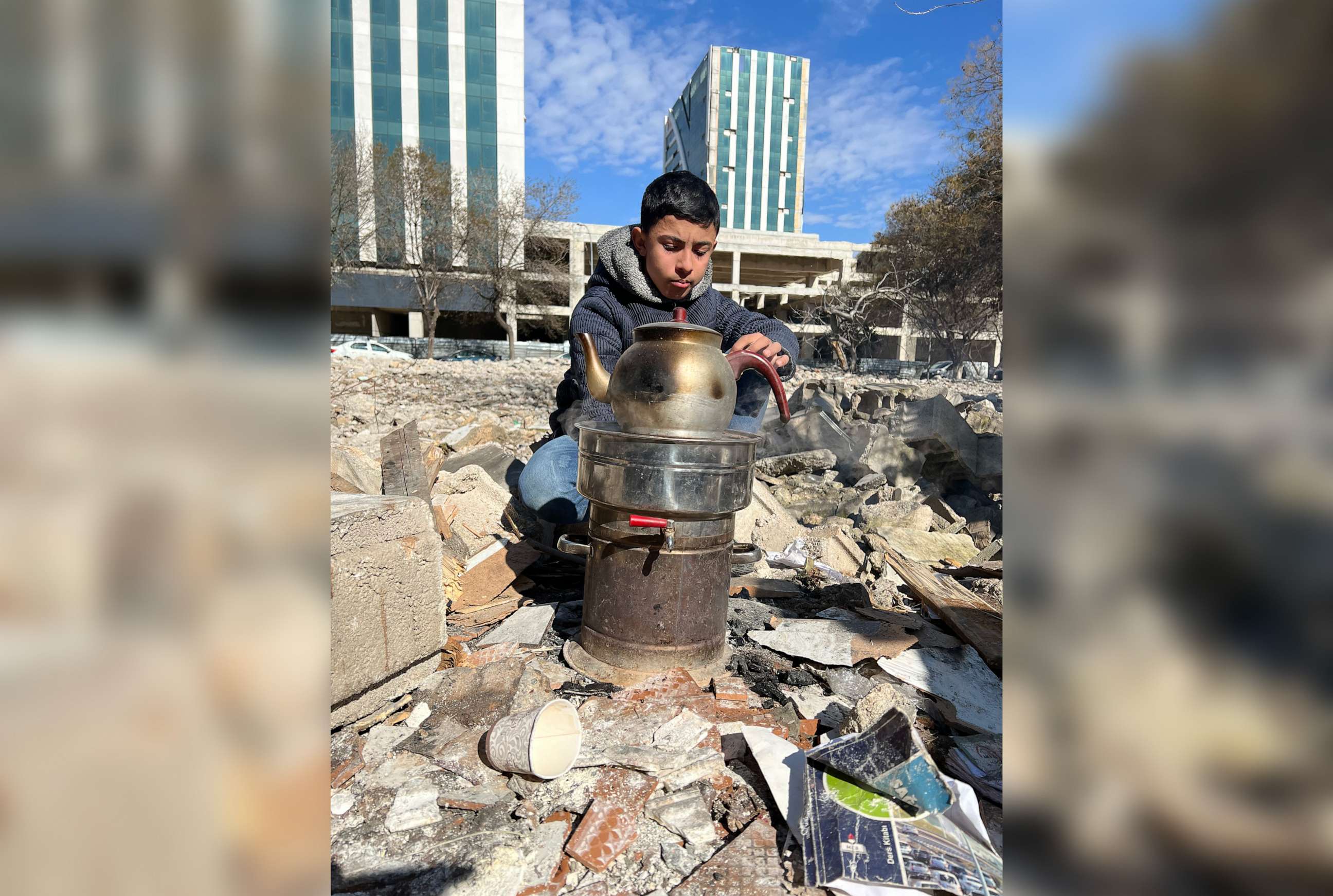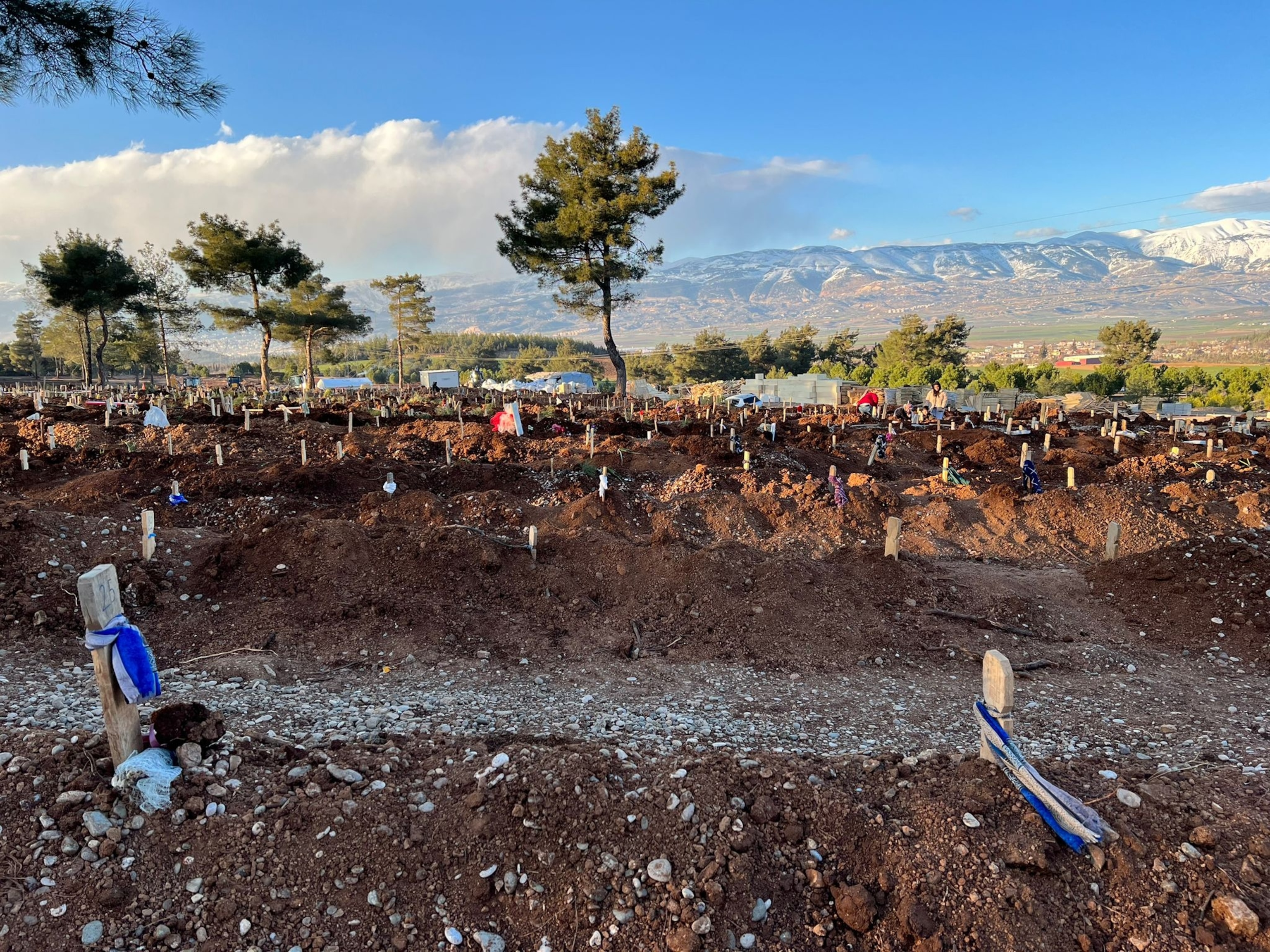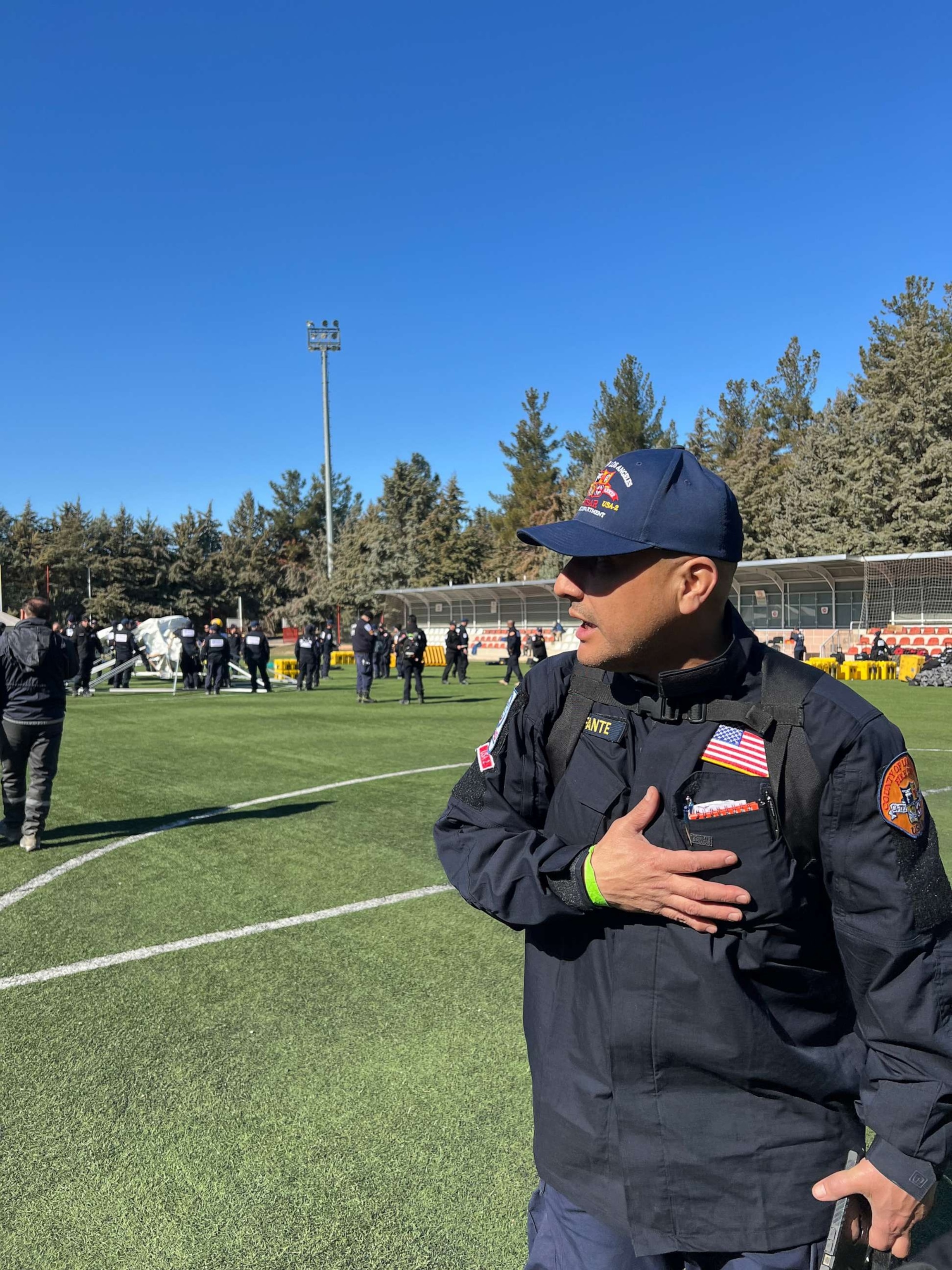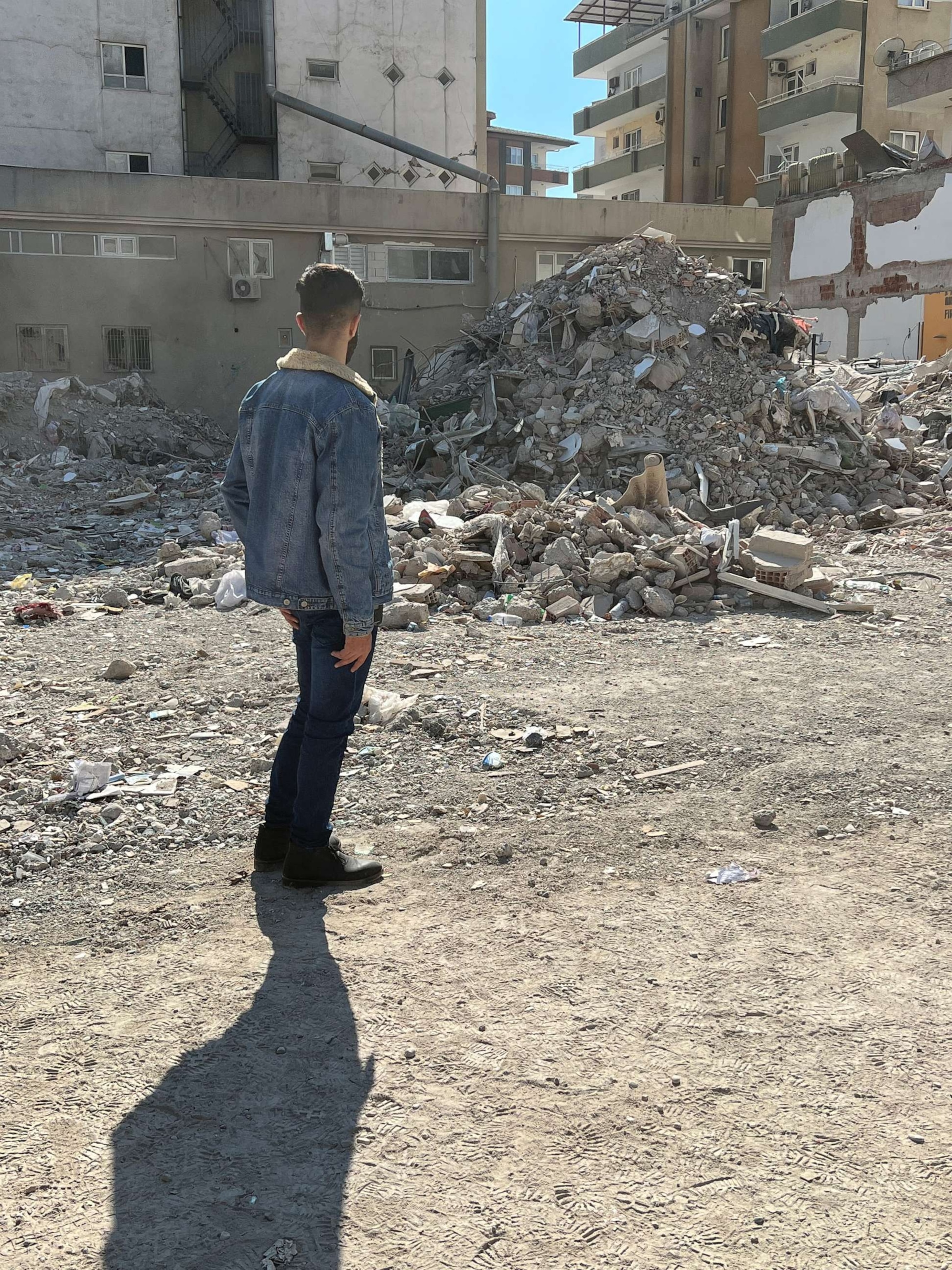Reporter's notebook: Amid the earthquake rubble in Turkey, surrounded by death, searching for signs of hope
ABC News' Ibtissem Guenfoud and Egnin Bas report from Turkey amid the quakes.
KAHRAMANMARAS, Turkey -- A woman is crying on the phone. In the hall of Istanbul airport, groups of young volunteers are lying on each other's laps, getting a few hours of shut-eye before their flight: tell-tale signs of a sleepless night, waking up to news of a once-in-a-century earthquake and of knowing what awaits them.
A few hours before, terrible images started emerging from Turkey and Syria of a massive earthquake; the death toll is already staggering, 3,000 lives lost and counting. It's snowing when we land in Istanbul. Flights are getting cancelled all over the place or delayed due to the bad weather, as we, countless relatives and thousands of rescuers and aid workers try to reach the earthquake zone, hundreds of miles away. Questions will soon be raised as to how the authorities could have helped with the fast transport of teams and equipment to the ground. President Recep Tayyip Erdoğan asked on Monday for "absolution" for the delays.

For now, it's up to locals to save their neighbors. Construction vehicles brought in from the farmlands invade the streets, creating absolute havoc in city centers, but they're the only engines powerful enough to break through the concrete prisons trapping Adiyaman residents. As our team goes on air from the center of town, one of the excavators crosses the pavement to get to the other side of street, almost flattening us. Hundreds of volunteers are standing at road turns and crossroads, doing the essential but difficult mission of guiding traffic for the big machines to reach the buildings in time.

Not in Syria though, where no such equipment is available, we will later learn. The White Helmets repeatedly asked for search and rescue engines and heavy vehicles, but they never came. Syrians died trapped under their own homes; on the fifth day, the White Helmets ended their rescue effort towards a recovery operation.
We see the mammoth vehicles extracting buried lives in Turkey. The rescues are broadcast live on national TV and the whole country is watching. When we land in Diyarbakir, a woman is being pulled out alive, after over 24 hours under the rubble of an eight-story building. There is an excavator there but the dozens of rescuers on site are not using it when we arrive. A man yells to stay silent and all engines come to a halt. Onlookers, many of them relatives, who were not very chatty to begin with, stop moving. "Inside! Do you hear my voice? Anybody?" For a time, the only movement on our cameras is from the freezing rain. Two women are clutching each other, watching. The yellow-hatted volunteers are standing still too, only listening for a while. Moments later, sounds of urgent removal of stones and steel return.
The same scenes are unfolding across southern Turkey. This is one among 108,000 buildings destroyed or damaged in the disaster zone, according to the Turkish vice president. It takes our team days to drive through the zone extending 42,000 square miles, roughly the size of the state of Virgina.
Near the epicenter, prayers for the missing
On our drive to the epicenter, we reach the city of Gaziantep, one of the oldest inhabited cities in the world, known for its covered market and a maze of paved streets where now all traditional stores are shut. Giant blocks of beige stone have rolled onto the street from the 2,000 year-old fortress in its center, one of Turkey's heritage monuments from Roman times. It survived centuries of conquests and countless invaders, but a 7.8 magnitude earthquake finally damaged it. We meet Gullu and her granddaughter Hatice, huddled by a small fire. A few yards away, rescuers are listening again but the 66-year-old keeps wailing and raising her hands up to the sky as we speak to her. She is praying to Allah. It's been over 72 hours since the quake; chances of her grandson being alive are next to none. "He is dead," she says. Hatice, 25, tries to calm her down; the young woman has a smile on her face that appears to be the only thing keeping her family together. The mother, we are told, is catatonic.

In Kahramanmaras, the construction vehicles are continually unearthing life, but they are burying the dead too, turning yards of forest land on the hilltops into many rows of freshly dug graves.

Combined official numbers set the provisional death toll at over 50,000 people in Turkey and Syria but the only certainty is that there are no reliable numbers yet; too many buildings have not been searched, too many areas not reached. We see far more body bags heading to the cemeteries than wounded taken to the hospital.
Rescue teams search the rubble, listening for signs of life
It's been 10 days and the stench of bodies in Kahramanmaras, the epicenter of the earthquake, permeates the dusty air. A family is crying on the street, as we witness rescuers pulling more and more bodies from under a small mountain of rock, cement, twisted iron and belongings, all mushed together. Close by, prosecutors are taking samples of cement and cutting pieces of iron before placing them in evidence bags. They tell us under condition of anonymity that the building developers have already been arrested.
Three responders from AFAD, the Turkish government disaster response organization, tell us the problem lies in part with the lack of structural components in the buildings. We see the debris for ourselves; many of the collapsed buildings appear to be only bricks with cement in between, with little or no structural fixative, nor proper steel to reinforce the concrete. They tell us about the diameter of the iron used, often too small to be effective; the standard is 35 to 50mm but the twisted bits now paving the streets are maximum 10 to 25mm wide. They point to the corruption. While some buildings should never have been built so high according to regulations, bribes were allegedly used to get around them.
In Adiyaman, a man hears us speak and comes up to us; he describes in perfect English a desperate search for their own for two days before rescue teams arrived. He tells us his entire family, 15 people, is gone. “There was nothing I could do,” he says. In the villages, it’s even worse. Another man says help didn’t get to them for three or four days. Some remote towns in high altitude weren't reached for days.
A team of Taiwanese rescuers managed to be among the first to reach Adiyaman city from outside, 48 hours after the quakes; "we could only save two people," a local diplomat, Pinwei, who is helping coordinate the effort, tells me. Their work is challenging on many fronts; coordination between teams is nightmarish, "the problem is other international teams don't mark the sites they have searched already," Frank Infante says, an information officer with U.S. Agency for International Development, "instead it's double the work for everyone." The weather conditions are fatal, with some survivors dying of hypothermia.
The help, once deployed, is impressive.
"Through concrete, we can listen to voices, friction or taps on the wall," Virginia taskforce rescuer Alex Obert tells us. He shows us a small box the size of your palm called a "life detector." They stick it onto slabs of concrete to resonate the sound. Over 70 countries answered Erdoğan's call for international assistance. The American teams from Los Angeles County and Virginia brought 170,000 lbs. worth of specialized equipment and the expertise of two of the best rescue teams in the world.

"We got intel that a baby is crying," Infante tells us. In less than half an hour, the rescuers conclude that the site is unworkable; "We sent the dogs first … but we don't believe that any life is under there," Infante says. Rescue teams search site after site, moving from one to the next. It is already too late.
After examining over 2,000 buildings, the U.S. teams determine that about a third of them have been destroyed, a third have been damaged beyond help and another third are still live-able. That's two-thirds of the city's inhabitants left without a home.
A sign of hope brings tears
On our way back to the hotel, Hatice sends me a message that brings tears to our eyes. After witnessing so much death and devastation, we get to cover life again. They found her cousin. Adnan, 17, refused to jump out the window from the second floor when his building shook, fearful of endangering his future in soccer. Instead, he crouched in recovery position and spent the next four days praying. He set up his alarm every 25 minutes not to lose consciousness; eating the flowers around his house; waiting for the acidity of his urine to drop before drinking it. His mother cannot stop hugging and kissing him. She crosses the living room where the whole family reunites over Turkish breakfast to sit right next to him as we interview him. "We have always been connected, my son and I," she says. She never stopped believing that he was alive. His grandmother Gullu sings for him because "it's his second birthday," she says, "he got a second chance at life."
His family also tells us they knew the building was unsafe, ever since the landlord removed one of the structural pillars to make room for his jewelry store on the ground floor. The next day another resident of the building confirmed their claims. Turkish authorities issued at least 113 arrest warrants for property developers since the earthquakes started. The fear is that cases of shady landlords like this will slip through the cracks.

Adnan won’t be the last miracle to happen in Turkey but his story is among the exceptions. That night in the hotel, a woman is crying uncontrollably for hours in the next room; a man is talking to her, trying to calm her down but it sounds like the kind of loss you don't recover from. Perhaps a lover or a child.But perhaps she is simply a volunteer breaking down after hours of rescue efforts ended in the discovery of a small limp body. That hotel is full with rescue teams and aid workers. It suffered minor damage and there is no hot water or food served at the moment; elevators are too dangerous to use -- it's a nine-floor walk-up. Our security adviser says he will sleep with his clothes on, just in case. One night, our driver decides to sleep in the van instead.
Another strong earthquake among thousands of aftershocks
It's a cold, brutal night outside and many thousands are sleeping in tents or in their cars. As we drive around the Gaziantep city center, where all the shops and restaurants have shut down, the only lights we see are those of small fires around which the homeless are sitting or standing. There is a bundle of covers and plastic bags around them. The flickering lights look like so many vigils or Roman burials. On Sunday, Feb. 19, the rescue efforts officially ended in Turkey. But with 13.5 million affected across the region, the next phase of this disaster is only beginning.
Over 9,000 aftershocks and two more tremors have occurred in the region since the quakes. A third earthquake of lower intensity, measured at a magnitude of 6.3 by the U.S. Geological Survey, rocked the region again on Monday, killing at least 6 and injuring hundreds more. It further traumatized populations and cracked more homes. Already shell-shocked, some of those living in temporary shelter decided to exit the region entirely.
For those who've stayed, a group of men is building Turkish toilets with bricks and cement in the temporary camp for the homeless of Nurdagi. But for now, everyone goes behind a bush with a bottle of water. The government says every building in Nurdagi has suffered some damage and needs to be taken down. They will rebuild on top of it. But that could take up to a year; aid groups warn that even a few months spent in these tents with so little access to basic necessities will be deadly. Many of the people here are Syrians who moved to Turkey to find a safe place to raise their families, away from war and devastation. For the first few days, they had nowhere to go, no food and no water. They slept in their cars until the tents from the Red Crescent arrived.

A young Syrian woman tells me her house in Idlib collapsed onto her sisters when one of the Russian planes bombed it. Her new building in Nurdagi was destroyed in the earthquake and she is now homeless again. After surviving the man-made tragedy, she is forced to reckon with nature too.
Marwan, 30, built a house and opened a shop just down the road after fleeing the war 8 years ago, creating a new life from scratch. The earthquake washed it all away.
Yet, among the few miracles to have happened here, Marwan says he still hasn’t lost hope for better days.
ABC News' Abd AlRazzaq Alshami and Bruno Nota contributed to this story.




